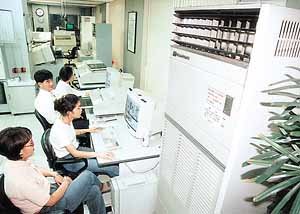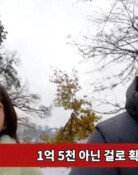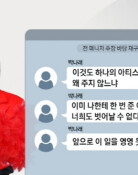Summer Cold & Air-Conditioning Syndrome
Summer Cold & Air-Conditioning Syndrome
Posted July. 08, 2001 20:29,

``Do you have a cold due to air conditioner?``
A white-collar worker Lee (35) has been suffering headache and high fever for one week. Lee is resentful of the air conditioner. Because Lee dislikes hot weather, Lee turns on the air conditioner at the maximum high both at the office and at home. Lee used to praise the air conditioner.
Lee went to sleep with the air conditioner on for several nights due to the tropical night phenomenon. This became the source of calamity. As symptoms of headache, high fever, and muscle aches continue, Lee went to a hospital. Lee was diagnosed of the `air-conditioning syndrome`.
The number of patients is increasing after `improperly using` the air conditioner due to the continuing hot weather. One should watch out for the air-conditioning syndrome because it is not easily cured and it often recurs.
- Even a dog is not susceptible to a summer cold? People who often use the air-cooling equipments are more susceptible to the summer cold. Summer cold, which is also called `air-conditioning pharyngitis`, is a precursor of the air-conditioning syndrome. In the beginning, symptoms of headache and fever appear. When the symptoms get worse, mucous membrane of the throat swallows and the muscle aches follow. One should be careful when sitting in a place in which the temperature is more than 5 degrees lower than the outside for two hours during summer. One needs to soothe the symptoms with antibiotics or antipyretic, and to drink lots of liquids accompanied by sufficient rest.
- Causes and symptoms of the air-conditioning syndrome: This syndrome appears when the human body cannot adjust to the extreme temperature difference between indoor and outdoor. When a person stays in an environment where the temperature difference between indoor and outdoor is more than 5-8 degrees, autonomous nervous system can be easily broken. Blood circulations in the brain, stomach, and other important organs malfunction due to the quick contraction following the failure of the biorhythm.
Symptoms vary. Most patients have respiratory problems. When air-conditioner is operated for more than an hour, the indoor temperature drops by 30-40 percent because air-cooling equipments like air conditioner bring down the indoor temperature by freezing the moisture within the air. Other symptoms are as such; headache, dizziness, malaise, exhaustion, joint pain, muscle aches, indigestion, and abdominal pain.
Especially, working women should be careful. Women are more susceptible to this syndrome not only because women are more sensitive to the cold weather but also because women are vulnerable to the wind from the air conditioner when wearing exposed clothes in summer. Women can suffer irregular menstrual period or emotional disturbance. Elderly people can develop facial paralysis.
- Dangerous legionnaire’s disease: This is one of the fatal air-conditioning syndrome. This disease is infected by the legionella bacteria, which were cultured in the unclean cooling water used for the central air conditioning system of the large buildings, such as hotels and department stores. The disease is infected by the bacteria in the air or water through the respiratory organs. After 2-12 days of incubation period, symptoms of coughs, high fever, and muscle aches appear. Complications, such as pneumonia, also develop. When it becomes worse, cardiac insufficiency and unconsciousness can develop leading to death. The best way to prevent this disease is to wash the air conditioner filter with the cleaner once every two week. One does not need to worry about the household air conditioner.
- Prevention and Treatment: It is good to keep the room temperature at 25 degrees Celsius when the air conditioner is turned on, and to ventilate the room every hour. One should not be directly exposed to the wind from the air-conditioner, and keep the 50 percent of the humidity by using the humidifier. If one works at the air-conditioned office all day, it is good to prepare a blanket or extra clothes to cover the knee. It is also good to drink a lot of liquids such as warm water or tea as often as possible, instead of drinking caffeine contained coffee or sodas. Don’t forget to eat fruits that contain vitamins along with regular physical exercises.
(Advice: Professor Song Yun-Mi, Family Medicine at Samsung Seoul Hospital)
Yun Sang-Ho ysh1005@donga.com







